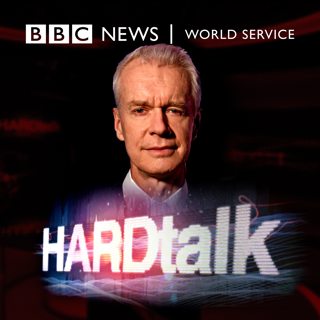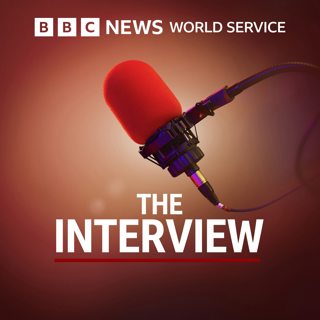
Michael Barber - Chief Education Advisor, Pearson PLC
The United Nations had hoped that by 2015 every child would be able to go to primary school. But the last time they reported on progress to that goal, they said 69 million children were still not getting an education - most of those in sub-Saharan Africa. Michael Barber has advised governments around the world about education. He's now working for the international company Pearson. It recently announced it would invest millions in private schools for the world's poorest families. Is that the right way to tackle the problem or could it undermine what governments are trying to do?
13 Aug 201223min

Mark Carney - Governor of Canada's Central Bank
London's reputation as a global financial centre has been tarnished yet again. This time another British bank Standard Chartered, stands accused of irregularities. New York's top financial regulator claims the bank carried out $240 billion dollars of illegal transactions with Iran over the past decade. The bank refutes the claim. This latest case follows on the heels of other scandals in the City of London. Moves are underway to tighten international banking regulation. So where does the problem lie? Zeinab Badawi talks to Mark Carney, who is in charge of steering these new rules as Chairman of the Financial Stability Board for the G20 Leading economies. He's also Governor of Canada's Central Bank.(Image: Bank of Canada Governor Mark Carney. Credit: REUTERS/Chris Wattie)
10 Aug 201223min

Nigel Farage - Leader of the UK Independence Party
As another wave of financial fear sweeps through the Eurozone, with Spain seemingly staggering towards a bail out and Italy not far behind, the voices of the continents Eurosceptics grow louder. Most prominent among them is Nigel Farage, leader of the UK independence party and self-styled scourge of the EU establishment in his role as a member of the European Parliament. In Europe's crisis he sees political opportunity; but is he playing with fire?(Image: Nigel Farage)
5 Aug 201223min

Amos Gilad – Director of Policy, Israeli Ministry of Defence
Zeinab Badawi talks to Amos Gilad, Policy Director at the Israeli Ministry of Defence. Is the Arab Spring a blessing or a disaster for Israel?Upheaval in the Arab world, especially in Syria, means political realities are still evolving in the Middle East. For years Israel has seen itself as living in a hostile neighbourhood, its borders tense and prone to bouts of violence. Hamas rules in Gaza and the peace process with the Palestinian Authority is going nowhere. And then there's Iran - neither an Arab nation nor a neighbour, but a powerful backer of Syria's government in the current turmoil. And for Israeli military planners, a potential threat from a nuclear-armed Iran is probably their biggest pre-occupation.(Image: Amos Gilad)
31 Jul 201223min

Sheikh Hasina - Prime Minister of Bangladesh
Sheikh Hasina has been Prime Minister of Bangladesh for the last three and a half years. It’s her second term in office and throughout her time at the top she’s attracted controversy and criticism in equal measure. Bangladesh is densely populated, desperately poor and riven with corruption and political violence. Back in 2009 Sheikh Hasina vowed to clean up government and heal the country’s divisions. So what’s gone wrong?(Image: Sheikh Hasina. Credit: Getty Images)
29 Jul 201223min

Extratime: Nawal El Moutawakel -Member of the International Olympic Committee
At the Los Angeles Olympics in 1984 a diminutive Moroccan runner named Nawal El Moutawakel won the 400 metres hurdles and so became the first Arab and Muslim woman to win Olympic gold. She says her victory changed her life forever and propelled her towards a career in sports administration and as a passionate advocate of women in sport, especially in the Islamic world. She's now an influential member of the International Olympic Committee. With current IOC president Jacques Rogge due to step down next year, could she be in line to succeed him? Nawal El Moutawakel talks to Rob Bonnet.(Image: Nawal El Moutawakel in 2010. Credit: Getty Images)
27 Jul 201223min

Arnold Ekpe - CEO Ecobank Transnational Inc
Six of the world's ten fastest growing economies are in Sub- Saharan Africa. The World Bank predicts a decade of African growth which Europe can only dream of, but how realistic is the excitable talk of economic transformation in the world’s poorest continent? Stephen Sackur speaks to Arnold Ekpe, CEO of Ecobank, which boasts eight million customers across 32 Sub-Saharan nations. As economic opportunity beckons, are Africans ready to seize it?
24 Jul 201223min

Extratime: Jonathan Edwards - Olympic triple jump gold medallist
More than 10,000 athletes are about to compete at the London Olympics. The spotlight will certainly be on them but one former champion, Jonathan Edwards, will take a particular interest. He won Olympic gold in the triple jump and his world record in the event has stood secure for 17 years. On present form no triple jumper to compete in London looks close to breaking it. He was also part of London's bid when the city was awarded the Games in 2005. Now he's the athletes' representative on the Games organising committee overseeing preparations for the athletes. London is almost at the start line but what did it take to get this far? Jonathan Edwards talks to Rob Bonnet.(Image: Jonathan Edwards. Credit: AP Photo/Herbert Knosowski)
23 Jul 201223min






















